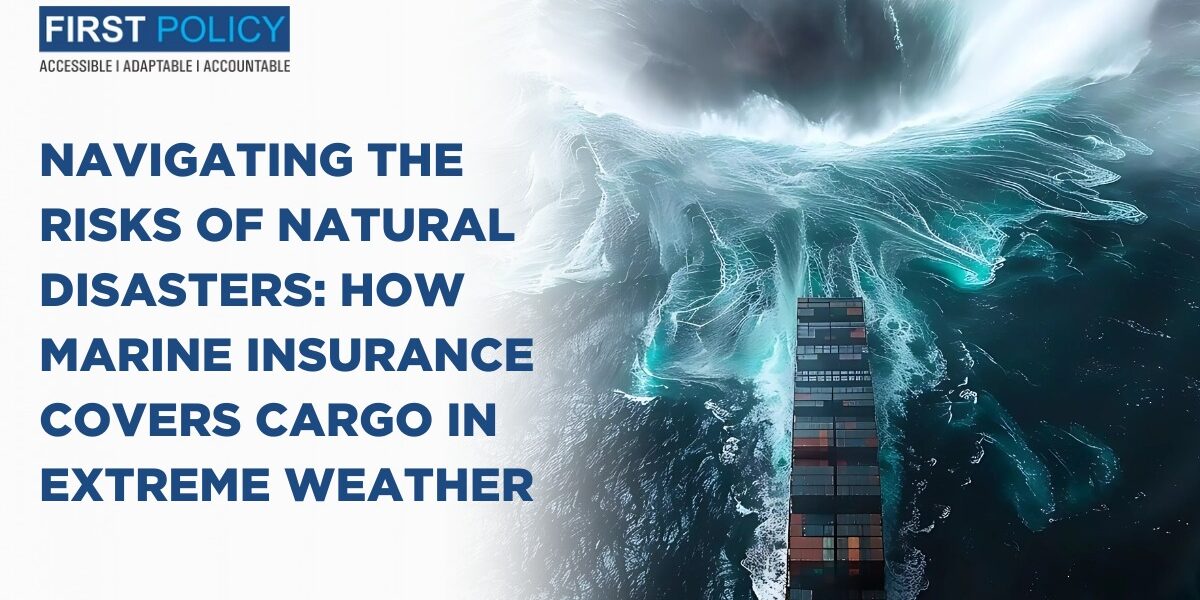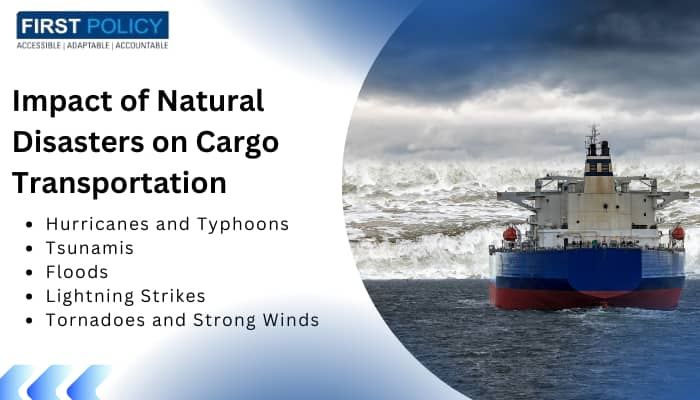
Navigating the Risks of Natural Disasters: How Marine Insurance Covers Cargo in Extreme Weather
Modern businesses need unhindered shipping of goods throughout extensive international distances in this globalized era. Nature routinely puts up challenges across shipping routes that endanger the protection of delivered goods. Supply chains face interruptions and companies suffer substantial financial losses because of extreme weather phenomena such as hurricanes and typhoons together with tsunamis and floods. The protection of cargo as well as the risk reduction from natural disasters depends on marine insurance as an essential mechanism.
Understanding Marine Insurance and Its Importance
The insurance dedicated to ships by sea and air and inland waterways exists as a unique service for protecting transport. The insurance provides financial security because it defends against possible losses or damage which can occur to cargo while it moves between locations. Manufacturing and trading firms in international trade need reliable marine and cargo insurance due to unpredictable weather patterns.
Cargo faces serious damage because of natural disasters. Intense weather conditions create hazards that result in shipwrecks and floating container losses and damage merchandise with water. Lack of proper marine transit insurance can cause significant money losses to businesses. Businesses that obtain cargo insurance can survive all types of severe weather incidents without significant financial damage.
The Impact of Natural Disasters on Cargo Transportation
Transportation of cargo faces substantial dangers from nature-based disasters. Several extreme weather events occurred with these following outcomes:

- Hurricanes and Typhoons –
Anticyclones as well as typhoons present shipping routes to severe weather risks by generating powerful winds and intensive rainfall with destructive tidal heights. Hurricane-treacherous environments present ships with several threats including vessel damage and sinking potential and water-introduced container damage.
- Capsizing or sinking
- Shipping containers endure destruction because of strong impact waves.
- Dry goods exposed to water damage may become destroyed because of moisture penetration.
The purchase of complete marine insurance provides businesses with financial relief through reimbursements caused by weather-related incidence.
- Tsunamis –
Undersea earthquakes create tsunamis which result in disastrous destruction of coastal ports and shipping facilities in the sea. The powerful waves can:
- Destroy port facilities
- Sweep away cargo from docks
- Water damage leading to loss of goods
Both marine and cargo insurance operates to provide compensation for unexpected conditions that damage business assets.
- Floods –
Supply chains come under disruption because flood conditions arise from high storms and overflowing rivers and heavy rainfall through these three main mechanisms:
- Submerging shipping containers at ports
- Postponed deliveries will occur because infrastructure components show damage
- Spoiling perishable goods
Through marine transit insurance businesses can recover their financial losses which stem from damages caused by flooding events.
- Lightning Strikes –
Lightning strikes occurring rarely can cause ship damage resulting in electrical system breakdowns together with resulting fires and broken equipment units. Cargo Insurance coverage for cargo protects goods from fire damage and covers all related risks that occur when moving merchandise through transportation.
- Tornadoes and Strong Winds –
The combination of tornadoes and strong wind forces makes cargo vessels lose their navigation course while suffering damages and resulting delivery delays. The consequence of moving containers to the deck is their ability to be expelled into the ocean which causes major financial damage to the business. The insurance coverage for transit helps organizations regain their financial losses from such events.
How Marine Insurance Covers Cargo in Extreme Weather
Global traders must obtain appropriate marine insurance policies which will protect their shipments. The coverage offered by marine and cargo insurance functions according to these specifications:
- Protection Against Physical Loss and Damage –
Material harm to cargo also happens when extreme weather strikes and results in its complete destruction. Marine transit insurance covers:
- Damage due to water ingress
- Goods lost at sea
- Structural damage to cargo due to heavy impact
The insurance protection shields businesses from financial losses which arise from natural disasters.
- General Average and Salvage Charges –
Ships applying the principle of General Average must throw away cargo during storm conditions in order to stabilize the vessel. Under this policy arrangement everyone accepts a portion of the costs. By taking on this financial liability marine insurance companies shield their clients from holding sole responsibility for the expenses.
- Delay in Shipment Due to Natural Disasters –
Various natural disasters accompanied by storms and floods result in delayed transportation of goods. Through transit insurance businesses benefit from payments which help substitute financial losses stemming from delayed shipping that allows operations to keep running smoothly.
- Port and Warehouse Damages –
Natural disasters deliver major blows that destroy both maritime facilities and buildings used for storage. During storage of goods which encounter damage or spoilage the financial compensation comes from cargo insurance.
- Liability Coverage for Third-Party Damages –
The damage of third-party properties occurs as a result of extreme weather-caused accidents. Marine insurance companies provide liability protection to businesses through coverage which defends them against legal third-party claims because of their faulty products or services.
Choosing the Right Marine and Cargo Insurance
The selection of suitable marine insurance policy stands essential to obtain complete protection. The following elements must be evaluated by businesses before making their insurance decisions:
- Coverage Scope –
A marine transit insurance policy should include complete protection for all potential risks stemming from natural disasters such as storm damage and shipwreck alongside water ingress.
- Policy Exclusions –
Review policy exclusions carefully. Some marine insurance companies have specific limitations regarding specific natural disasters such that they need specific policy statements to grant coverage to those events.
- Claim Process Efficiency –
A business needs an efficient and fast claims settlement process to operate successfully. Companies must opt for marine insurance firms that offer simple and efficient claims procedures.
- Customization Options –
Businesses require different shipping-related requirements which need to be considered in their operations. Select a cargo insurance policy featuring customizable options according to your delivery product variety as well as shipping route specifications.
FAQ’S
Severe destruction of vessels and cargo together with ports and shipping infrastructure happens due to natural disasters such as hurricanes and floods and tsunamis and lightning which results in financial losses and delayed deliveries.
The standard terms of marine insurance protect against ship capsizing and water ingress as well as cargo destruction that results from extreme wind and waves observed in hurricanes and typhoons conditions.
Yes. Under marine insurance policies cargo owners and vessel owners attain coverage for their products in case they suffer loss during tsunamis and the collapse of dock facilities along coastlines
Yes. As per specific insurance policies, onboard equipment damage from lightning strikes along with the resulting fires gets covered by cargo insurance provisions.





